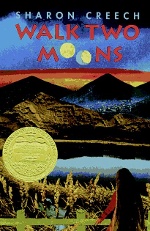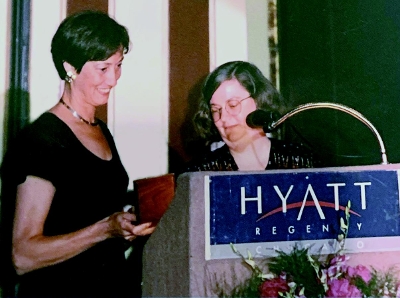After the Call: Everything Is Possible
Most of you are probably familiar with the Newbery traditions: the secret choice, the phone call, and the frenzy that follows. I had lived overseas for sixteen years and was not aware of these traditions, nor was I aware of the American Library Association or its vast network.
Walk Two Moons was the first of my books to be published in the U.S.
Most of you are probably familiar with the Newbery traditions: the secret choice, the phone call, and the frenzy that follows. I had lived overseas for sixteen years and was not aware of these traditions, nor was I aware of the American Library Association or its vast network.
 Walk Two Moons was the first of my books to be published in the U.S. (I’d previously published one children’s and two adult novels in England.)
Walk Two Moons was the first of my books to be published in the U.S. (I’d previously published one children’s and two adult novels in England.)
This was before email or cellphones or social media. If there was any “buzz” about my book, I was completely unaware. On February 6, 1995, I was home alone in England when the Newbery committee phoned to say that Walk Two Moons was receiving the Newbery Medal. I may have said, “The what?”
I still go weak when I think of that call coming so unexpectedly, jolting my world so intensely. When the publicist from HarperCollins phoned, I asked, “So how many of these medals are awarded each year? A hundred? Two hundred?”
After a brief pause, perhaps to register my innocence or ignorance, the publicist said, “One, Sharon. One!”
I had difficulty coming to grips with why I was receiving such good fortune, and why my book was receiving such an honor. When I first read articles referring to me as an “unknown” (“Unknown Wins Newbery Medal!”), I felt peculiar, as if I’d previously been invisible. But the articles were accurate: I was unknown in the field of children’s books in the States. An unknown has simple prayers: please let my books be published; please let readers know these books exist; and please let me keep writing. I would soon discover that the Newbery answers these prayers.
In my 2012 novel The Great Unexpected, I touched on the notions of unexpected good fortune and the mixed feelings it generates. The main character’s reactions to receiving an inheritance mirror my own at receiving the Newbery Award:
Maybe sudden change of any kind…jolts your world. The whole planet had tilted in an instant, and I was wobbling along at a slant, trying to regain my balance.
I had never given an interview and had no ready answers, no sound bites about where I get my ideas or why and how I became a writer. I had never written or delivered a speech but learned that I was expected to give an acceptance speech to two thousand librarians at the June ALA convention. I was pretty sure I was going to have a heart attack.
“Don’t worry,” Bill Morris (legendary HarperCollins gentleman) said. “They will shore you up with waves of love.”
He was right. They shored me up. To quote again from The Great Unexpected, when I stood up on the stage facing that audience,
it felt as if someone had pulled me…up a tall, tall ladder, and stretching out before [me] was all the world to see and know. I thought about the kindness of strangers. I thought about…the great unexpected…It seemed that everything and anything was possible.
What did winning the Newbery mean to me? It meant validation as a writer, bountiful opportunity, and responsibility to young readers and the world of children’s literature.

Creech with 1995 Newbery committee chair Kathleen T. Horning (right) at the banquet. Photo courtesy of Sharon Creech.
I was and am overwhelmingly grateful for this award and for the opportunity to dwell in the buoyant world of children’s books, with its wise educators, beautiful young readers, and fellow writers. I don’t know if I’ll ever be able to convey fully how much this award has meant. With one phone call from Philadelphia to London on February 6, 1995, my life was dramatically altered.
I’ve worked hard to honor the responsibility that comes with the award.
I’m still trying to accept the good fortune.
From the May/June 2022 special issue of The Horn Book Magazine: The Newbery Centennial.
RELATED
ALREADY A SUBSCRIBER? LOG IN
We are currently offering this content for free. Sign up now to activate your personal profile, where you can save articles for future viewing.






Add Comment :-
Be the first reader to comment.
Comment Policy:
Comment should not be empty !!!